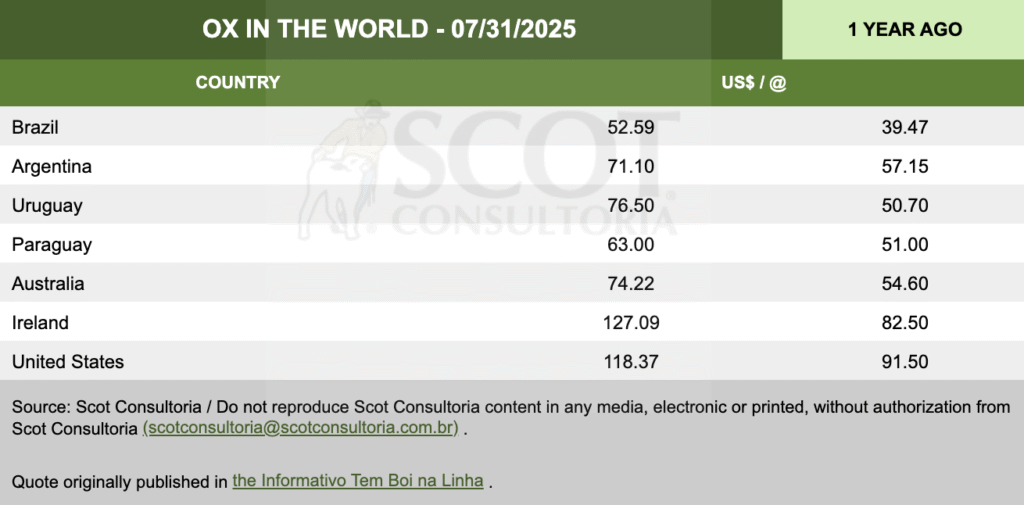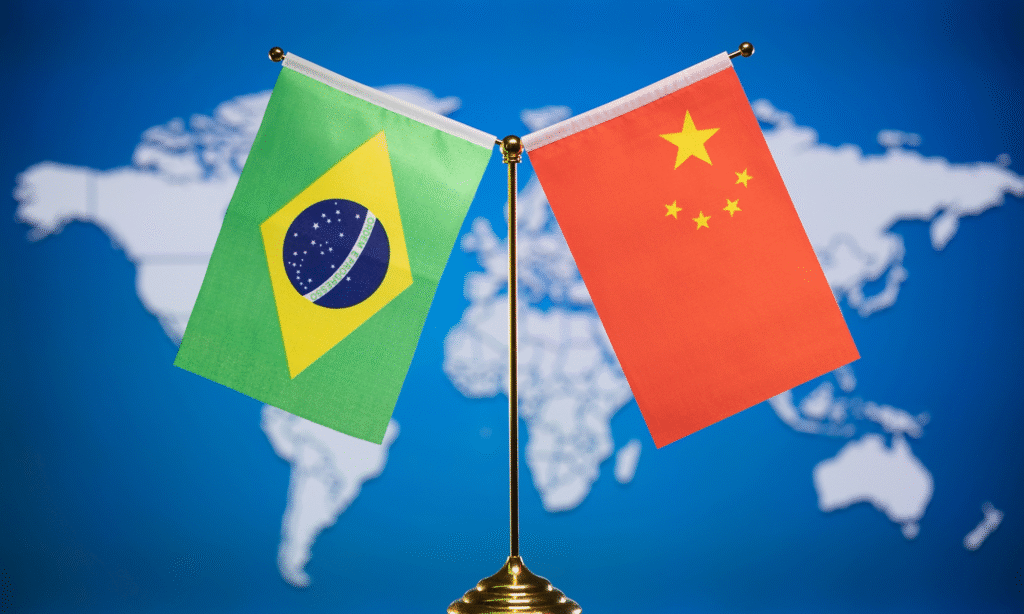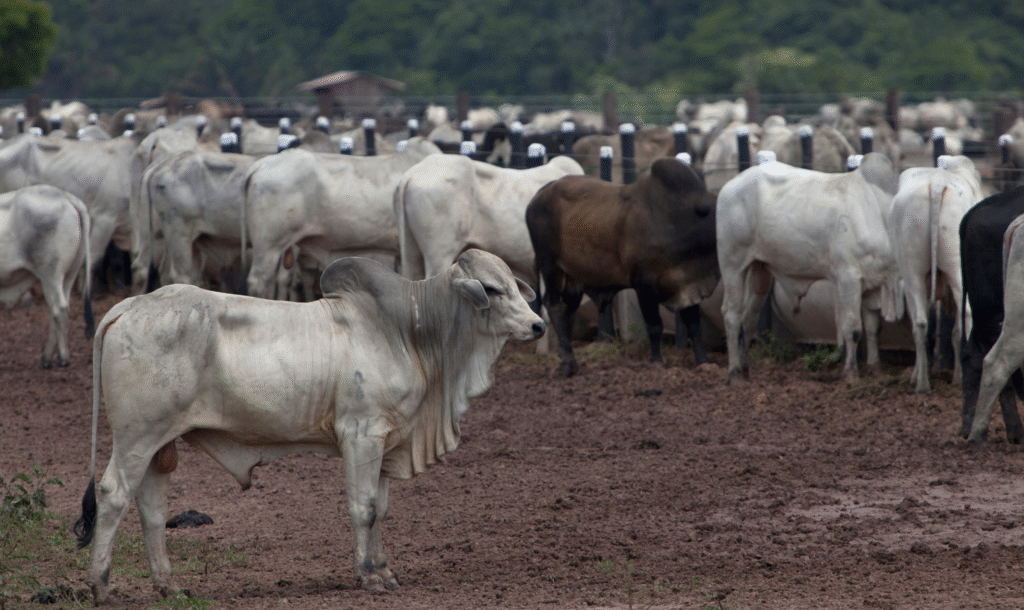“O LUCRO SUMIU.”
“The profit is gone.”
That’s not a slogan—it’s a warning.
Brazil’s cattle are “worth” $52 on paper—less than half the U.S. price. But local ranchers don’t get that. The export premium? Reserved for China-approved carcasses, controlled by JBS.
This system was built in the ’90s: a legal tripod of green rules, health codes, and labor laws that crushed local butchers and trapped ranchers under cartel control.
Then came Trump’s 50% tariff—and for the first time, the pipeline cracked.

A Free Market in Name Only

Brazil is the world’s largest beef exporter. But at $52.59 per arroba (unit of weight in Brazil), it sells cattle for less than half the price of Ireland ($127.09) and the U.S. ($118.37), according to Scot Consultoria’s global index.
So who’s winning?
Not the local rancher. Not the consumer. Not the independent butcher—who was systematically erased from the marketplace.
The real winners are the ones sitting at the top of Brazil’s meat-for-gadgets export racket. Specifically: JBS.
Skip the cartel. Get your Tariff-Free Steak Bundle straight from Ebersole Cattle Co. in Southern Iowa.
“Tripé Legal” and the Rise of the Meat Cartel
In the 1990s, Brazil’s Plano Real ushered in neoliberal reforms that deregulated markets and exposed small producers to global competition.
Insiders call it the “Tripé Legal”—a three-legged chokehold made up of:
- Environmental regulation (targeting land use and deforestation)
- Sanitary codes (restricting slaughter and transport)
- Labor compliance (raising costs beyond small rancher margins)
“Criou-se um ambiente aonde apenas uma empresa como a JBS, amparada pelo Estado, poderia sobreviver.”
“Only a company like JBS, propped up by the state, could survive in this system,”
– Anonymous Beef News Source, Brazilian Cattle Producer
As small operations were buried under bureaucracy, JBS rose. By 2017, the company processed nearly 48% of slaughtered cattle in Mato Grosso—a stronghold of independent ranching.
Unearthed later revealed that JBS bought nearly 9,000 cattle from one of Brazil’s top illegal deforesters—proving the rules only apply to outsiders.

You Don’t Sell Cattle in Brazil. You Sell to JBS.
There’s no law stopping a rancher from selling locally.
There’s just nowhere to go.
JBS controls the slaughterhouses.
JBS owns the certifications.
JBS writes the contracts.
And thanks to “Boi China”, JBS also names the price.
“Boi China” (literally “China Beef“) refers to cattle that meet China’s export standards—typically younger, Nellore breed bulls raised under strict sanitary conditions. These cattle can sell for R$10–R$15 more per arroba than regular stock, as confirmed by 2023 Brazilian coverage.

But small ranchers are frozen out:
- They can’t afford certification.
- They can’t access compliant slaughterhouses.
- And they sure as hell don’t get invited to ship beef by the cargo container.
“Todo proteina produzida no Brasil passa necessariamente pelas mãos da JBS.”
“Every gram of protein in Brazil passes through JBS.“
In short: no matter where you raise it, JBS sells it.
Meat for Gadgets, Dollars for Control

So where does all that beef go? China. But it’s not trade in any real sense—it’s barter.
“O Brasil envia um navio de carne ou soja e recebe um navio de carros elétricos ou eletrônicos.”
“Brazil sends beef. China sends gadgets.“
The export pipeline runs on U.S. dollars—driven by the massive price gap between cheap Brazilian beef and high-margin American sales.
Here’s how it works:
- buy cattle cheap in brazil
- sell high-margin beef in the u.s.
- use those dollars to ship bulk to china
- lock out small ranchers from export premiums
- pay floor prices at home, keep the spread
“O esquema depende de dólares para lubrificar as engrenagens da corrupção.”
“The whole scheme runs on dollars to grease the gears of corruption.“

Trump Just Kicked the Chair Out
In July 2025, President Trump imposed a 50% tariff on Brazilian beef, calling it a national security risk.
That one move blew a hole in the arbitrage racket.
“Com a taxação de 50%, esgota-se a graxa do ágio gigantesco da JBS no mercado americano.”
“With the 50% tariff, JBS can no longer skim the massive markup it needs from U.S. sales.“
Now the pipeline to China is sputtering. And Beijing is already backing away:
“A China prefere um acordo com Trump do que atrito por causa de produtos brasileiros.”
“China would rather deal with Trump than defend Brazilian beef.“
The Mask-Off Moment
Let’s say it plainly:
This isn’t a supply chain. It’s a cartel.
JBS sets the price. China calls the shots. Brazil gets bled dry.
Local ranchers? Erased.
Independent butchers? Dead.
Domestic food security? Sacrificed for gadgets and graft.
And it was all done under the green mask of traceability, “sustainability,” and global trade compliance.
Dollar Sovereignty, Rancher Independence
Trump’s tariff cracked the code. Now we blow it wide open.
Decentralized slaughter. Rancher Direct certification. Market diversification.
These aren’t talking points. They’re survival.
If we want to break the cartel—in Brazil or the U.S.—it starts by kicking every rigged leg out from under the “tripé legal.”
Start with this one:
More processors. Fewer price fixers.
Find ranchers who aren’t feeding the system—only their neighbors—at BeefMaps.com.




0 Comments